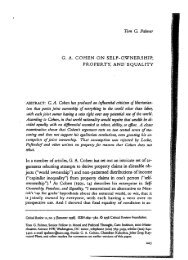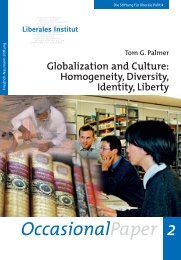Are Patents and Copyrights Morally Justified? - Tom G. Palmer
Are Patents and Copyrights Morally Justified? - Tom G. Palmer
Are Patents and Copyrights Morally Justified? - Tom G. Palmer
You also want an ePaper? Increase the reach of your titles
YUMPU automatically turns print PDFs into web optimized ePapers that Google loves.
No. 3] <strong>Are</strong> <strong>Patents</strong> <strong>and</strong> <strong>Copyrights</strong> <strong>Morally</strong> <strong>Justified</strong>? 841<br />
not be restricted by copyright: “He [an editor] represents himself,<br />
not as that author as ifhe were speaking through him, but<br />
as another. Translation into another language is also not infringement,<br />
for it is not the very speech ofthe author although<br />
the thoughts may be the same.” 94<br />
Like Kant, Hegel argues that artistic reproductions are “so<br />
peculiarly the property of the individual artist that a copy of a<br />
work of art is essentially a product of the copyist’s own mental<br />
<strong>and</strong> technical ability,” while the reproduction ofliterary works<br />
or of inventions “is of a mechanical kind.” 95 Hegel declared<br />
further that “this power to reproduce has a special character,<br />
viz, it is that in virtue ofwhich the thing is not merely a possession<br />
but a capital asset.” 96 The right of reproduction of inventions<br />
or literary works derives from their nature as capital<br />
assets, <strong>and</strong> not merepossessions. They yield an income stream,<br />
the diminution of which substantially diminishes the value of<br />
the capital.<br />
The theories of personal rights <strong>and</strong> of personality set forth<br />
by Kant <strong>and</strong> Hegel have been extended in the last hundred<br />
years or so to embrace a range ofrights to artistic productions<br />
far wider than they envisioned. Indeed, these alleged rights are<br />
not, like Anglo-American copyrights, fully alienable, but are, as<br />
the French 1957 Law on Artistic <strong>and</strong> Literary Property 97 declares,<br />
“perpetual, inalienable, <strong>and</strong> imprescriptible.” 98 Substantial<br />
efforts have been made to import this notion into<br />
American law, much of them occasioned by the introduction of<br />
the technique of “colorizing” films originally produced in<br />
black-<strong>and</strong>-white. 99<br />
As developed under French law, four such personal rights<br />
are retained by artists: the right of disclosure, the right of attribution,<br />
the right of integrity, <strong>and</strong> the right of retraction.’ 0 °<br />
94. Id.<br />
95. G. HEGEL, supra note 78, at 54.<br />
96. Id. at 55.<br />
97. C. civ. art. 548, Code penal (C.pCn.I arts. 425.429 (“Lawof March 11, 1957 on<br />
literary<strong>and</strong> artistic property”); see also Loi du 11 mars 1957 cur Ia propriété littéraire et<br />
artistique, 1957 Journal Officiel de Ia Republique Française U.O.1 2728, 1957 Recuetl<br />
Dailoz Legislation [D.L.] 102 (for amendments <strong>and</strong> cases interpreting the statute).<br />
98. Sd.<br />
99. For an overview of the proposed legislation, as well as a discussion of the pros<br />
<strong>and</strong> cons of these proposals, see Donnelly, Artist’s Rights <strong>and</strong> copyrights, i CoNG. QUAR-<br />
TERLY’s RES. REP. 245 (1988); see also Wash. Post, May 22, 1988, at Fl, col. I.<br />
100. See Damich, The Right of Personality: A Common-Law Basis for the Protection of the<br />
Moral Rights ofAuthors, 23 GA. L. REV. 1, ~6-25(1988).











